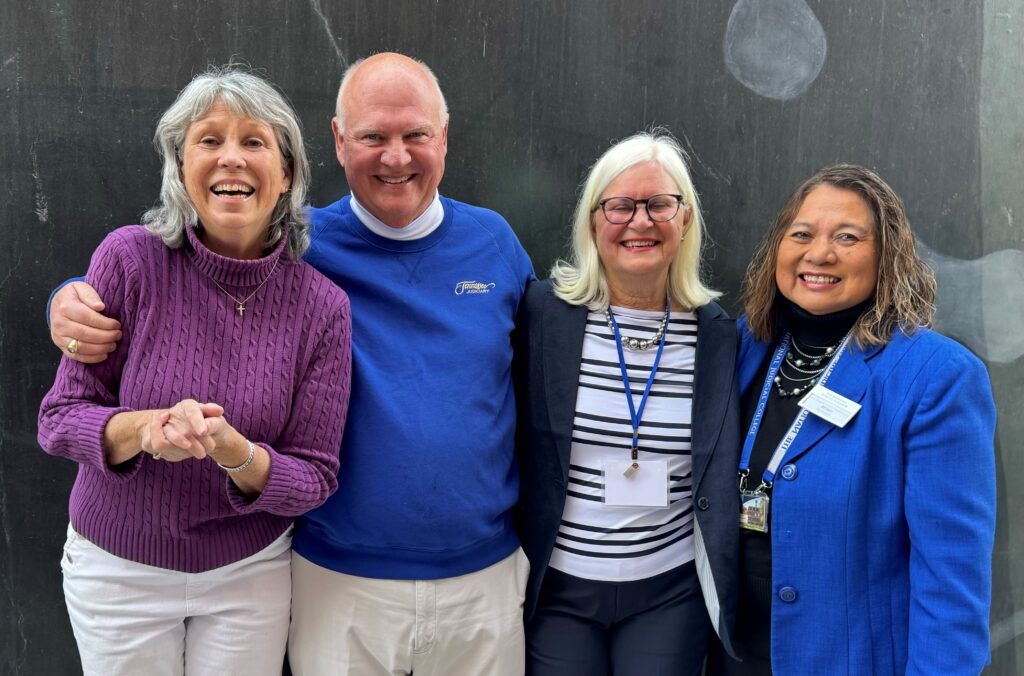
After 22 years of teaching judges, Tennessee Senior Judge Don Ash will retire as a regular faculty member at the National Judicial College. Judge Ash has taught nearly 1500 judges from around the country and world and has taught 50 courses in just over two decades.

Two of his fellow instructors — Judge Susan Conyers from Oklahoma and Judge Karen Adam from Arizona — made special trips to the judicial college to wish Judge Ash well during the celebration held at a dinner during the General Jurisdiction course. Judge Ash started his relationship with the college at the same course and ended his regular faculty role as a discussion group leader.
“I was just thrilled to see Susan and Karen. We have become such good friends as we have taught and even created classes together,” Judge Ash said. “When I first came here in 1995 with then-Chancellor Steve Stafford and Judge Bill Acree, I listened to the faculty teach and I thought they were just so gifted. I wanted to become a better judge, more knowledgeable, and the judicial college built the foundation I have used every day as a judge.”
After that first trip to the judicial college in 1995, Judge Ash not only took more classes, but earned a master’s degree in judicial studies through a program created by the judicial college and the University of Nevada, Reno. His thesis focused on custody laws, and after thorough research, he proposed changes to Tennessee law. He took the proposal to the Tennessee General Assembly, which enacted his suggestions.
“With the help of 30 to 40 other judges and 50 to 60 people overall, we were able to have the custody laws changed,” Judge Ash said. “This is why we have parenting plans, mediation, and other requirements today. It’s unbelievable. I would have never had the opportunity to draft that legislation if I hadn’t had the support and the drive that the judicial college gave me to make that effort.”
In 2001, the National Judicial College asked Judge Ash to join the faculty. Over the years, he has taught judicial ethics, case management, and current issues in the law. In addition, he and several other judges and subject matter experts worked together to custom create a course on managing self-represented litigants.
“Judge Ash has been an invaluable asset to the judicial college over the past 22 years,” Judge Benes Aldana (Ret.), president of the National Judicial College, said. “He has shared his expertise with so many judges, and I know justice has been more fairly and efficiently administered because of his work. We while miss seeing him on a regular basis, but he has ensured us he will be available for special courses and opportunities if the need arises.”
Because of his work with the judicial college, Judge Ash has been an invited speaker to dozens of judicial conferences. He jokes that he has an open dinner invitation in almost every state in the country. He also
said he has thoroughly enjoyed his many trips to Reno, on occasion turning the trip into a family vacation with adventures to Lake Tahoe, Yosemite National Park, San Francisco, and other nearby sites.
“I think part of being a good judge is continuing to learn and with a constantly changing environment, there are always new issues that judges need to learn more about,” Judge Ash said. “Plus, you make great friendships with other judges from across the country and you find out that they have the same issues and blessings that you do. It makes time serving on the bench more enjoyable.”
To ensure other judges have the opportunity to create similar experiences, Judge Ash set up a scholarship at the judicial college for Tennessee judges to attend courses.
“I felt I needed to give something back and give people the opportunity to have the same opportunity I had,” he said. “I wanted a scholarship at the judicial college to help Tennessee judges come out here and take advantage of the judicial education. Judicial education has to be a priority.”

CHICAGO – The American Bar Association Judicial Division announced recently that TheNational Ju...

The National Judicial College is mourning the loss of former faculty member Judge Duane Harves, who passed ...

As the world manages an evolving natural environment, The National Judicial College announced today that it...

Do’s Manage your cases systematically Devise a system that works for you and your organizational...

After 22 years of teaching judges, Tennessee Senior Judge Don Ash will retire as a regular faculty member a...